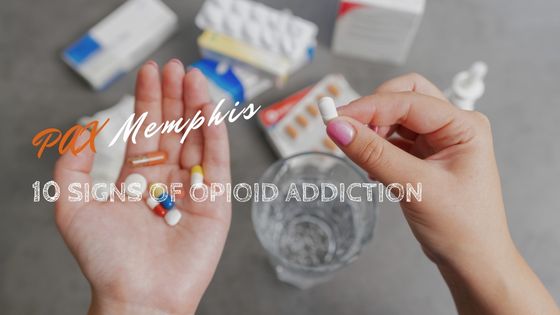Opioid addiction is a substance use disorder that can severely impact a person’s social, physical, and mental health. People may also experience life-altering financial, social, and legal consequences that follow them for the rest of their lives. Left untreated, opioid addiction can become life-threatening.
Recognizing the signs of opioid addiction is the first step toward getting the help you need to overcome it. Opioid addiction can significantly change how a person thinks, feels, and behaves. This article will outline ten of the most common signs of opioid addiction and how to find the treatment you need to overcome this complex condition.
Reach out to the PAX Memphis team now to explore our holistic substance abuse treatment programs or find support during any stage of addiction recovery.
What are Opioids?
Opioids are drugs that can be synthetic– meaning created from chemicals– or naturally derived from parts of the opium poppy plant. There are two types of opioids: prescription medications for pain relief and illicit street drugs, including heroin.
Doctors typically prescribe opioids to help patients manage pain after surgery, injury, or from a chronic condition. Opioids are intended for short-term use to reduce the risk of dependence. However, opioids are highly addictive, and patients may quickly develop tolerance and physical dependence.
Some commonly abused prescription opioids include:
- Codeine
- Fentanyl
- Hydrocodone
- Oxycodone
- Hydromorphone
- Oxymorphone
- Methadone
- Morphine
- Tramadol
Anyone taking these prescription painkillers must be aware of the signs of opioid addiction and seek treatment as soon as possible.
Understanding Opioid Addiction
Opioids bind with receptors in the brain in areas related to pleasure and reward. The way opioids work in the body makes them highly addictive. People who take them with a prescription are less likely to become addicted to opioids than people who use them recreationally. Still, anyone who takes opioids may develop a physical dependence on them.
Some of the consequences of opioid addiction include:
- Behavioral changes
- Isolation
- Participation in illegal activities
- Financial problems
- Mood swings
- Neglecting hygiene, relationships, hobbies, and responsibilities
People who abuse opioids are also at increased risk of a deadly overdose.
Certain risk factors make a person more likely to develop opioid addiction. These risk factors include:
- History of substance abuse
- Current substance abuse
- Age
- Environment
- Family history of substance abuse and addiction
- Untreated mental illness
Mental health and addiction experts believe that a person’s environment, lifestyle, and genetics can contribute to their likelihood of developing an opioid use disorder. However, anyone who uses opioids– even with a prescription– may develop symptoms of dependence and addiction.
Anyone who takes opioids must watch for signs of abuse and addiction and seek treatment as soon as they recognize a problem.
10 Signs of Opioid Addiction
Here are ten common signs of opioid addiction.
1. Taking more
Opioids effectively relieve moderate to severe pain. They also produce a feeling of euphoria and relaxation that some people find desirable. These additional, pleasant effects may make people want to use them in higher doses or more frequently than prescribed. People may also continue taking opioids longer than their doctor told them to.
2. Cravings
Cravings are one of the signs of opioid addiction to watch for. People who are physically dependent on opioids may crave them or spend a lot of time thinking about how to get more.
3. Neglecting responsibilities
When somebody lives with addiction, everything else falls by the wayside. They may stop spending time with friends and family, neglect their responsibilities at home, work, or school, or lose interest in their hobbies.
4. Taking risks
One of the signs of opioid addiction is engaging in risky behaviors. People with opioid addiction may drive under the influence, have risky sex, or participate in illegal activities to support their substance use.
5. Tolerance
Tolerance is one of the most significant signs of opiate addiction and should never be ignored. Tolerance means that a person needs to take higher or more frequent doses of a drug to get the desired effects and is a sign of physical dependence.
6. Withdrawal symptoms
Withdrawal symptoms may develop if somebody with opioid addiction suddenly stops taking these drugs. Withdrawal symptoms can be very uncomfortable, including nausea, tremors, body aches, headaches, insomnia, and vomiting.
7. Time and energy
People with opioid addiction may spend significant amounts of time and energy trying to get, use, and recover from using opioids. They may fall behind in every other area of their life as the addiction tightens its grip.
8. Loss of control
People with opioid addiction do not choose to use these potent drugs– they cannot function without them. Physical dependence on opioids makes it impossible for people to control their opioid use.
9. Social problems
As opioid addiction deepens, people may lose sight of anything else in their lives. They may be estranged from friends, family members, and even their spouses and children. Loved ones may often feel helpless, angry, or sad as they watch the addicted person succumb to opioid abuse.
10. Recreational use
One of the most critical signs of opioid addiction is recreational use. Many people become addicted to opioids while taking a prescription drug. However, some people begin taking opioids recreationally, either by stealing it from others or buying it on the street. This dangerous practice puts people at risk of overdose and is a clear sign that someone needs help immediately.
Get Help for Opioid Addiction
If you or someone you love exhibits signs of opioid addiction, you are not alone. Reach out to the PAX Memphis team to find support and treatment for opioid addiction.
Getting the treatment you need is the first step toward the healthier, sober life you deserve. Call us now to get started.
Medically Reviewed: September 25, 2019

All of the information on this page has been reviewed and verified by a certified addiction professional.










